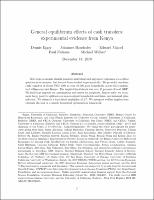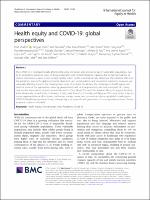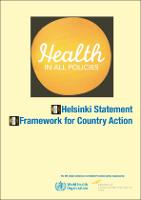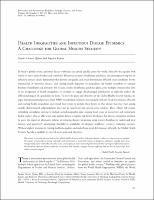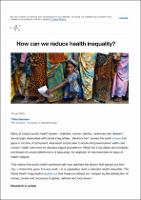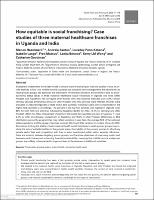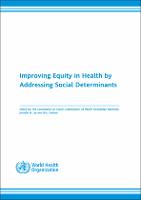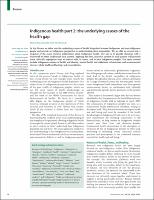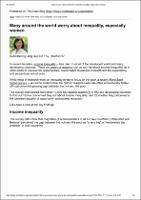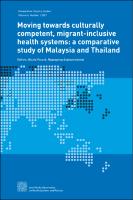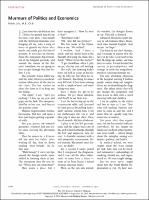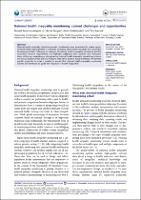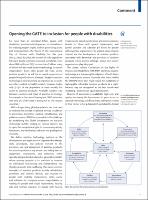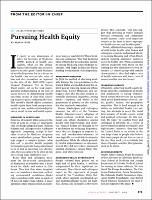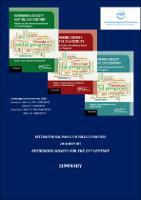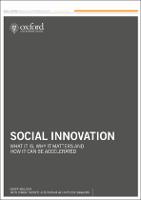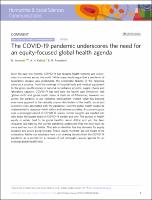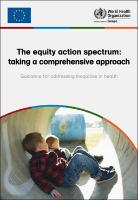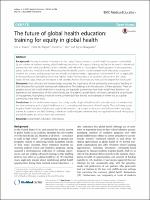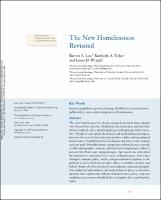Browsing 1.02.02 Health in All Policies by Title
Now showing items 30-49 of 55
-
General Equilibrium Effects of Cash Transfers: Experimental Evidence from Kenya
(National Bureau of Economic Research, 2019-12)
How large economic stimuli generate individual and aggregate responses is a central question in economics, but has not been studied experimentally. We provided one-time cash transfers of about USD 1000 to over 10,500 poor households across 653 randomized villages in rural Kenya. The implied fiscal shock was over 15 percent of local GDP. We find large impacts on consumption and assets for recipients. Importantly, we document large positive spillovers on non-recipient households and firms, and minimal price inflation. We estimate a local fiscal multiplier ... -
Health equity and COVID-19: global perspectives
(2020-12)
The COVID-19 is disproportionally affecting the poor, minorities and a broad range of vulnerable populations, due to its inequitable spread in areas of dense population and limited mitigation capacity due to high prevalence of chronic conditions or poor access to high quality public health and medical care. Moreover, the collateral effects of the pandemic due to the global economic downturn, and social isolation and movement restriction measures, are unequally affecting those in the lowest power strata of societies. To address the challenges to ... -
Health in all policies: Helsinki statement. Framework for country action
(World Health Organization, 2021)
The participants to the 8th Global Conference on Health Promotion endorsed the Helsinki Statement on Health in All Policies In which they prioritize health and equity as a core responsibility of governments to its peoples, affirm the compelling and urgent need for effective policy coherence for health and well-being and recognize that this will require political will, courage and strategic foresight. The participants of the Conference call on governments to fulfill their obligations to their people’s health and wellbeing by taking a number of ... -
Health Inequalities and Infectious Disease Epidemics: A Challenge for Global Health Security
(2014)
In today's global society, infectious disease outbreaks can spread quickly across the world, fueled by the rapidity with which we travel across borders and continents. Historical accounts of influenza pandemics and contemporary reports on infectious diseases clearly demonstrate that poverty, inequality, and social determinants of health create conditions for the transmission of infectious diseases, and existing health disparities or inequalities can further contribute to unequal burdens of morbidity and mortality. Yet, to date, studies of influenza ... -
How can we reduce health inequality?
(2015-01-19) -
How equitable is social franchising? Case studies of three maternal healthcare franchises in Uganda and India
(Oxford University Press in association with The London School of Hygiene and Tropical Medicine, 2018-04-01)
Substantial investments have been made in clinical social franchising to improve quality of care of private facilities in low- and middle-income countries but concerns have emerged that the benefits fail to reach poorer groups. We assessed the distribution of franchise utilization and content of care by socioeconomic status (SES) in three maternal healthcare social franchises in Uganda and India (Uttar Pradesh and Rajasthan). We surveyed 2179 women who had received antenatal care (ANC) and/or delivery services at franchise clinics (in Uttar Pradesh ... -
Improving equity in health by addressing social determinants
(World Health Organization, 2011)
This recently published book highlights actions to improve health equity based on findings from the nine global Knowledge Networks that were established during the WHO Commission on Social Determinants of Health. Their task was to synthesize existing evidence and identify effective and appropriate actions to improve health equity in nine thematic areas: - globalization; - gender; - social exclusion; - early child development; - urban settings; - employment conditions; - health systems; - public health programs; and - measurement and evidence. ... -
Indigenous health part 2: the underlying causes of the health gap
(The Lancet, 2009) -
Many around the world worry about inequality, especially women
(World Bank Blog, 2017) -
Moving towards culturally competent, migrant-inclusive health systems: a comparative study of Malaysia and Thailand
(the Asia Pacific Observatory on Health Systems and Policies, 2021)
Migrants are seldom included in policy discussions on the provision of health care, and in country policy reforms towards health for all. In addition, evidence on health care for migrant populations to inform and guide policy makers is limited. This Comparative Country Study (CCS) uses mixed-method approaches to analyse the extent to which two middle-income countries – Thailand and Malaysia, have culturally competent, migrant-inclusive health systems. The countries have taken different approaches to developing a migrant-inclusive health system. ... -
Murmurs of Politics and Economics
(New England Journal of Medicine, 2018-09-27) -
National health inequality monitoring: current challenges and opportunities
(Informa UK Limited, trading as Taylor & Francis Group, 2018-12-03)
National health inequality monitoring needs considerably more investment to realize equityoriented health improvements in countries, including advancement towards the Sustainable Development Goals. Following an overview of national health inequality monitoring and the associated resource requirements, we highlight challenges that countries may encounter when setting up, expanding or strengthening national health inequality monitoring systems, and discuss opportunities and key initiatives that aim to address these challenges. We provide specific ... -
Opening the GATE to inclusion for people with disabilities
(The Lancet, 2015) -
Pursuing Health Equity
(Health Affairs, 2017-06) -
Rethinking society for the 21st century: Report of the International Panel on Social Progress
(Cambridge University Press, 2018) -
Social innovation: what it is, why it matters and how it can be accelerated
(Young Foundation, 2007)
This report examines how social innovation happens in NGOs, the public sector, movements, networks and markets. It presents an analysis of the history, the theory and the process, paving a way for social innovation to play an increasingly significant role in society. Huge energies – and resources – are devoted to innovation in science and technology. But far less attention has been paid to social innovation, despite pressing needs in fields as diverse as chronic disease and climate change. This report examines the growing importance of social ... -
The COVID-19 pandemic underscores the need for an equity-focused global health agenda
(2021-12)
Over the past few months, COVID-19 has ravaged health systems and economies in countries across the world. While many would argue that a pandemic of respiratory disease was predictable, the systematic failures of the response came as a surprise. From the shortage of hospital beds and medical equipment to the gross insufficiencies in national surveillance systems, supply chains and laboratory capacity, COVID-19 has laid bare the health care limitations that ‘global north’ and ‘global south’ share. A stark set of differences, however, run across ... -
The equity action spectrum: taking a comprehensive approach : guidance for addressing inequities in health
(World Health Organization, Regional Office for Europe, 2014)
While population health indicators have improved across Europe overall, that improvement has not been experienced equally everywhere, or by all. This is one of a series of policy briefs that describe practical actions to address health inequities, especially in relation to tobacco, alcohol, obesity and injury, the priority public health challenges facing Europe. It offers policy-makers and public health professionals the tools and guidance to implement the Health 2020 vision – the new health policy framework for Europe developed by WHO/Europe ... -
The future of global health education: training for equity in global health
(BMC Medical Education, 2016)
Background: Among academic institutions in the United States, interest in global health has grown substantially: by the number of students seeking global health opportunities at all stages of training, and by the increase in institutional partnerships and newly established centers, institutes, and initiatives to house global health programs at undergraduate, public health and medical schools. Witnessing this remarkable growth should compel health educators to question whether the training and guidance that we provide to students today is appropriate, ... -
The New Homelessness Revisited
(Annual Review of Sociology, 2010)
The new homelessness has drawn sustained attention from scholars over the past three decades. Definitional inconsistencies and data limitations rendered early work during this period largely speculative in nature. Thanks to conceptual, theoretical, and methodological progress, however, the research literature now provides a fuller understanding of homelessness. Contributions by sociologists and other social scientists since the mid-1990s differentiate among types of homelessness, provide credible demographic estimates, and show how being homeless ...

